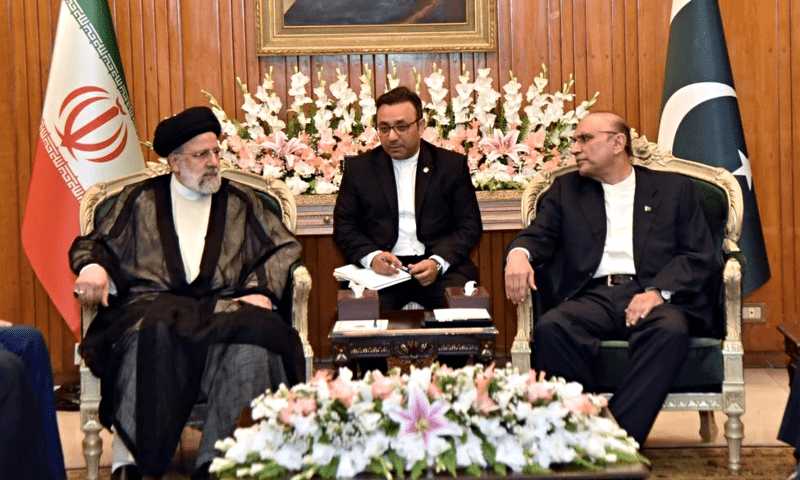Tehran and Islamabad agreed to “expeditiously finalise” a Free Trade Agreement (FTA), a joint statement said on Wednesday as Iranian President Ebrahim Raisi concluded his three-day official visit to Pakistan.
According to a joint statement issued by Iran and Pakistan, “both sides agreed to expeditiously finalise the FTA and hold the next sessions of annual Bilateral Political Consultations (BPC) and Joint Business Trade Committee (JBTC) as well as the 22nd round of the negotiations of the Joint Economic Commission (JEC) in the near future”.
Last month, Iranian Ambassador Dr Reza Amiri Moghadam had said the FTA would increase mutual trade, highlighting the need to have strong air, maritime and sea links.
The joint statement recalled the exchanges and meetings during Raisi’s visit to Pakistan, saying that both sides “reviewed the entire spectrum of Pakistan-Iran bilateral relations”.
Both neighbours also agreed to “enhance mutual interaction through regular exchange of high-level visits”, it added.
Pakistan and Iran also agreed to facilitate a regular exchange of economic and technical experts, as well as delegations from Chambers of Commerce from both countries to intensify economic cooperation.
The declaration of the Reemdan border point as an international border crossing point under the TIR Convention and the opening of the remaining two border sustenance markets was also agreed upon, the statement said.
It added that both countries “affirmed their commitment to transform their common border from ‘border of peace’ to a ‘border of prosperity’ through joint development-oriented economic projects, including setting up of joint border markets, economic free zones, and new border openings”.
“They also reiterated the importance of cooperation in the energy domain, including trade in electricity, power transmission lines and Iran-Pakistan Gas Pipeline Project,” the statement said, recalling their aim to increase bilateral trade volume to $10 billion dollars over the next five years.
“There was consensus to fully operationalise barter trade mechanisms between the two sides to facilitate economic and commercial activity,” the countries said.
Iran and Pakistan “expressed satisfaction at the close and cooperative relations between the two countries in all mechanisms” of the Shanghai Cooperation Organisation (SCO), underscoring the importance of early resumption of the activities of the SCO-Afghanistan Contact Group.
The two sides also called for active cooperation among the regional countries within the framework of the Economic Cooperation Organisation (ECO).
According to the statement, Raisi also extended cordial invitations to President Zardari and Prime Minister Shehbaz Sharif to pay official visits to Iran.
Iran and Pakistan also agreed on a number of steps aimed at combating terrorism, according to the joint statement.
Recognising that terrorism “posed a common threat to regional peace and stability and presented a major impediment to the development of the region”, the neighbours agreed to “adopt a collaborative approach to confront this menace […] while fully upholding the principles of the UN Charter”.
“Both sides reaffirmed their commitment to the development of Afghanistan as a peaceful, united, sovereign and independent state, free from the threats of terrorism and drug trafficking,” the statement said, adding that the two countries reaffirmed their willingness to “enhance cooperation on counter-terrorism and security and to develop a united front against terrorism”.
Noting the relevance of coordinating regional and international efforts to ensure security and stability in the region, Pakistan and Iran “recognised that increasing participation of all strata of Afghans in basic decision-making will lead to the strengthening of peace and stability in this country”.
The statement further said that both sides “stressed the importance of peaceful settlement of disputes through dialogue and diplomacy”.
The neighbours also expressed their agreement to “release each other’s prisoners and take measures for their extradition based on the Treaty for the Extradition of Criminals and the Accused signed in 1960 and the Agreement on the Transfer of Convicts approved in 2016.
Iran and Pakistan also condemned “rising incidents of Islamophobia, desecration of the Holy Quran and sacred symbols in some countries”. They welcomed the adoption of the United Nations General Assembly resolution titled “Measures to Combat Islamophobia” in March.
On the Gaza conflict, Pakistan and Iran “expressed their strong and unequivocal condemnation of the ongoing Israeli regime’s aggression and atrocities against the Palestinian people”. They called for an immediate and unconditional ceasefire in Gaza, as well as “ensuring accountability of the crimes being committed by the Israeli regime”.
The two sides “strongly condemned the attack on the consular section” of the Iranian Embassy in Syria’s Damascus, calling it a “violation of international law and the UN Charter”.
“Recognising that the irresponsible act of the Israeli regime forces was a major escalation in an already volatile region, both sides called on the UN Security Council to prevent Israeli regime from its adventurism in the region and its illegal acts attacking its neighbours and targeting foreign diplomatic facilities,” the statement added.
Both neighbours also highlighted the need to resolve the issue of India-occupied Kashmir through “dialogue and peaceful means based on the will of the people of that region and in accordance with international law”, it further said.


